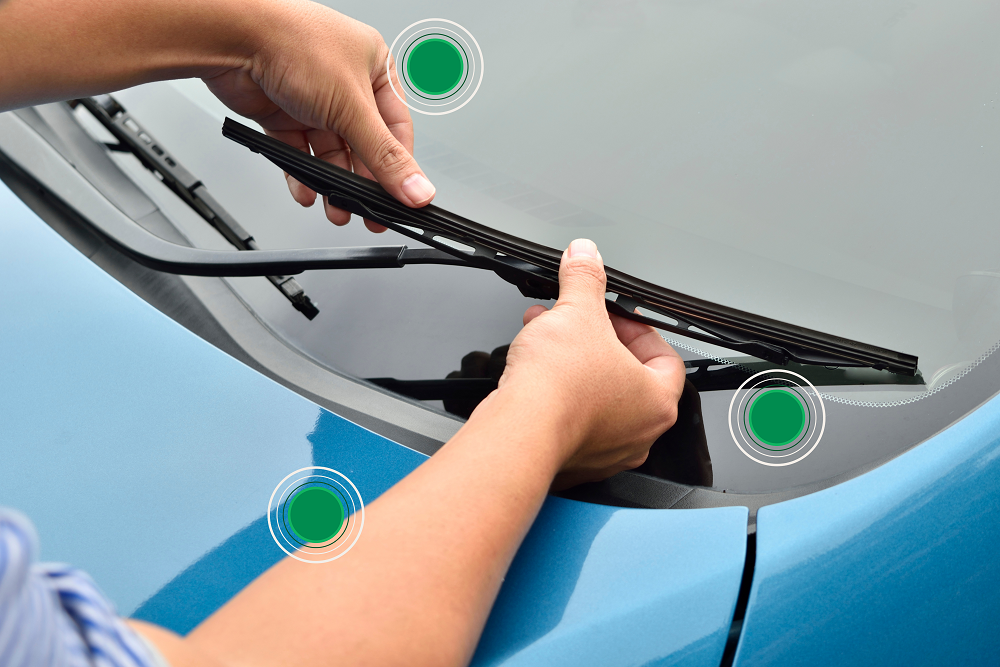
Beat the Summer Rain: Ensure Your Windscreen Wipers are Ready
Ah, the sweet scent of spring in South Africa! Jacaranda trees are blossoming, the veld is coming alive, and with summer just around the corner, we're all gearing up for those classic afternoon rain showers. But here's a quick pop quiz for SA drivers out there: When was the last time you checked your windscreen wipers? Surprising as it may be, these humble rubber strips play a huge role in keeping you safe on those wet drives home and should not be ignored.
At DEKRA, we're all about ensuring your vehicle is in tip-top shape. And guess what? During our Technical Inspections, windscreen wipers are on our checklist as well! Why? Because we recognise their crucial role, especially with the upcoming summer rainfall season, as few and far between bouts of rain might be these days. In this article, we're going to take a closer look at windscreen wipers, including their importance, how to give them the care they need, and how to troubleshoot common issues you might have. We've also included a section with tips for selecting the right windscreen wipers for your vehicle at the end, so be sure to check it out.
The Essential Role of Windscreen Wipers
- Safety
While driving along the Garden Route or navigating the bustling streets of Jozi, one thing remains constant: clear visibility is paramount to safety on the road. Windscreen wipers, as simple as they might seem, are frontline defenders in our safety crusade. When a sudden summer downpour strikes, it's your wipers that work tirelessly to ensure you maintain a clear line of sight. Without them, rain, dust, or even bird droppings can obscure your vision, increasing the risk of collisions or mishaps. A well-functioning wiper system allows drivers to spot potential hazards, navigate tricky road conditions, and react timely to sudden changes. In essence, they act as your eyes' trusty sidekicks, helping you see and respond with clarity.
- Comfort
It's not just about safety, though. Picture this: you're cruising along, your favourite tunes playing on the radio, when the heavens open up. Without efficient wipers, that relaxing drive quickly becomes a stressful ordeal, with you squinting and straining to see ahead. A good set of wipers ensures that even during the heaviest of storms, you can drive with the comfort of clear visibility, free from the distractions and strain of obscured vision. They also play a role in keeping your windscreen free from dust and debris, ensuring a pleasant drive whether you're headed to Durban's beaches or taking a scenic detour through the Drakensberg.
- Legal Implication
Under South African vehicle and road laws, driving with defective or non-functional wipers isn't just a hazard - it's illegal. The National Road Traffic Act (Act No. 93 of 1996) sets out clear standards for vehicle fitness, and this includes operational windscreen wipers (Section 203). A vehicle can be deemed unroadworthy if its wipers don't function properly or are in poor condition. This not only puts drivers at risk of hefty fines but can also affect vehicle insurance claims in the event of an accident. If you bring in your vehicle for a DEKRA Technical Inspection or a Roadworthy Vehicle Inspection, we will check that everything is in order with your wipers.

Photot credit: Ashwini Chaudhary(Monty) on Unsplash
Windscreen Wiper Maintenance and Care
- Lifespan of Typical Wiper Blades
Most windscreen wipers have a lifespan of about 6 to 12 months. However, the exact duration can vary based on factors such as the quality of the wiper, the climate, and frequency of use. For instance, if you often drive in areas with harsh sunlight (hello, Karoo sunsets!), the UV rays can deteriorate the rubber faster. Similarly, wipers used frequently in coastal cities like Cape Town might wear out sooner due to the salty air. It's essential to keep in mind that even if you don't use your wipers often, the rubber can still deteriorate over time.
- Signs of Wear and When to Replace Them
Finding out your wipers are past their prime on a rainy day sounds like bad timing to us. Here are some signs to look out for...
Streaking: If your wipers leave streaks or water spots, it's an indication that the blades may be worn, hardened, or cracked.
Squeaking: No, your car isn't trying to communicate with you. A squeaking sound usually means the wiper blade has lost its flexibility.
Skipping: If the wiper blade skips or misses areas on the windscreen, it could be a sign of a bent wiper arm or a deteriorated blade.
Physical appearance: Regularly check the wiper blades for cracks, splits, or any other visible damage.
- Proper Cleaning Techniques to Prolong Their Life
Integrate the following into your regular car maintenance routine to ensure that your windscreen wipers remain in tip-top condition.
Regular Cleaning: Use a soft cloth dampened with a mixture of water and a bit of dish soap to wipe the blades to remove accumulated dirt and grime.
Avoid Dry Operation: Always ensure there's moisture (either rain or washer fluid) when operating the wipers to prevent unnecessary wear.
Protect from Sun: If possible, park in shaded areas to prevent direct sunlight from degrading the wiper rubber.
Wiper Position during Frost: In frost-prone areas, pull the wipers away from the windscreen overnight to prevent them from sticking and tearing when you start your car in the morning.

Photot credit: Andrea Piacquadio on Pexels
Common Problems and Troubleshooting
Ah, the age-old wiper woes! It's happened to most of us: one moment you're enjoying a peaceful drive, the next, your wipers are staging a noisy protest or doing a half-hearted job. Let's break down some of these problems and get you back to a smear-free and silent drive.
1. Wiper Smearing or Streaking
The Problem: Instead of a clear view, your wipers leave behind smears, streaks, or water spots, making visibility a challenge or even dangerous.
Potential Causes and Solutions:
- Old or Damaged Blades: Over time, the rubber on wiper blades can deteriorate, leading to inefficient wiping.
Solution: Replace the wiper blades.
- Dirt and Debris: Accumulated dirt or debris on the blade can hinder its performance.
Solution: Clean the blades with a damp cloth mixed with a touch of dish soap.
- Oil or Wax Residue: Sometimes, residues from car washes or treatments can remain on the windscreen.
Solution: Clean your windscreen with a good-quality glass cleaner, and make sure to rinse thoroughly.
2. Squeaking Noises
The Problem: Your wipers screech every time they move, which can be annoying and distracting.
Potential Causes and Solutions:
- Dry Windscreen: Operating wipers on a dry windscreen can cause squeaking.
Solution: Always ensure there's moisture or use windshield washer fluid before using the wipers.
- Damaged or Hardened Blades: Just like with smearing, aged or damaged blades can make noise.
Solution: Consider replacing the blades.
- Incorrect Blade Angle: If the wiper blade isn't touching the windscreen at the right angle, it might squeak.
Solution: Adjust the wiper arm or consult a mechanic if you're unsure.
3. Incomplete Wiping or Missing Spots
The Problem: Your wipers seem to have a mind of their own, missing certain spots or not cleaning the entire area.
Potential Causes and Solutions:
- Worn Blades Older blades might not make consistent contact with the windscreen.
Solution: Time for a replacement.
- Misaligned Wiper Arm: If the arm holding the blade is bent or misaligned, it can cause inconsistent wiping.
Solution: Carefully adjust the arm back to its original position or have a professional take a look.
- Buildup on the Windscreen: Stubborn spots or films on the windscreen can resist wiping.
Solution: Thoroughly clean the windscreen using a quality cleaner and make sure to rinse properly.

Photot credit: Maria Tyutina on Pexels
Tips for Selecting the Right Windscreen Wipers for Your Vehicle
1. Check Your Owner's Manual
The simplest way to determine the correct wiper size for your vehicle is to consult the owner's manual. Manufacturers usually provide specifications or recommendations for replacement parts, including wiper blades.
2. Measure the Blades
If you can't find the info in your manual or simply want to double-check, take a tape measure and size up the length of your current wiper blades. Remember, sometimes the driver's side and passenger's side wipers can be of different lengths.
3. Consider Your Climate
If you're in regions prone to heavy rainfall, like parts of KwaZulu-Natal, or maybe have to deal with frosty winter mornings in the Free State, you might want to opt for heavy-duty or winter-specific wipers that can handle more severe conditions.
4. Choose the Right Type
There are various types of wiper blades:
Standard/Conventional Blades: The most common type, often with a metal/plastic frame holding a rubber blade.
Beam Blades: A one-piece design without external frames, offering uniform pressure and better performance in icy conditions.
Hybrid Blades: Combining features from both conventional and beam designs, it offers durability and a sleek look.
5. Brand Matters
While it might be tempting to go for the most affordable option, it's worth noting that reputable brands tend to offer higher quality products that last longer and perform better.
6. Attachments and Adapters
Some wiper blades come with specific attachment mechanisms. Ensure that the ones you're considering are compatible with your vehicle's wiper arm attachment.
7. Read Reviews
Online platforms and forums can provide insights from other drivers. They can be valuable resources for understanding the real-world performance of particular wiper models or brands.
8. When in Doubt, Ask
If you're still unsure, consult with auto parts retailers or mechanics. They can provide recommendations based on their experience and the specificities of your vehicle.

Photot credit: Thibault Valjevac on Unsplash
The sheer importance of windscreen wipers cannot be overstated, especially as South Africa braces itself for the upcoming summer rains. Whether it's to ensure safety, comfort, or meeting legal standards, these unassuming strips of rubber have got your back, quite literally helping you navigate the unpredictable dance of rain and road. But, like any other part of your vehicle, they demand regular attention, care, and occasional replacement. Remember, it's not just about reacting when there's an issue, but also pre-empting potential hazards.
DEKRA's focus on inspecting windscreen wipers during Technical Inspections is a testament to their significance in the realm of vehicular safety. It's our collective responsibility to not just know the law but also to understand the logic behind it. So, the next time those first raindrops patter on your windshield, and your wipers spring to action, give a thought to all you've learned. And for everything from expert inspections to peace of mind, know DEKRA is always here for you. Are you still feeling a bit unsure about the current state of your windscreen wipers and what to do about it? Don't worry. Book your vehicle in for a Vehicle Roadworthy Inspection, and we'll not only check your wipers, but we will inspect your tyres, brakes, lights, suspension, and steering as well. Contact us today.
Read Related Articles:
- What to Expect During a Roadworthy Inspection- The Advantages of Proper Car Maintenance: Vehicles and Long-Term Savings
- Vehicle Roadworthiness: What It Means and How to Maintain Your Car
- Is Your Vehicle Roadworthy?
- An Overview of DEKRA's Main Services